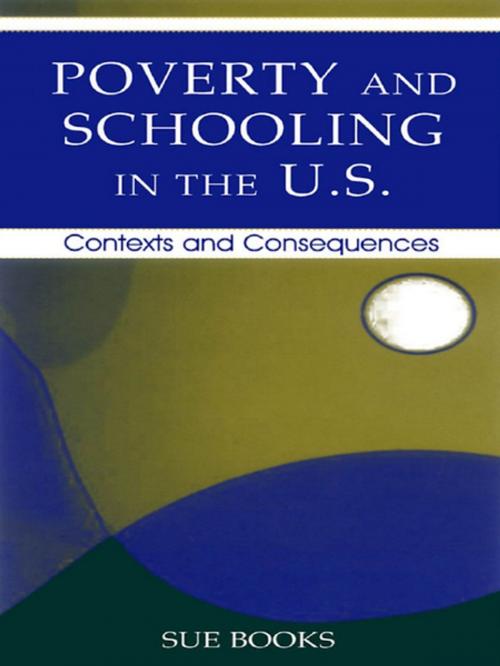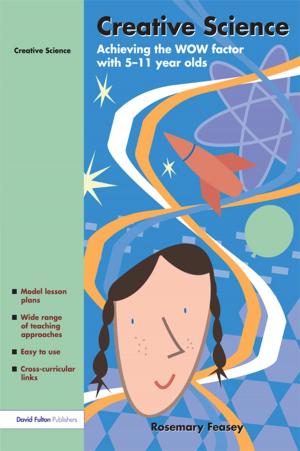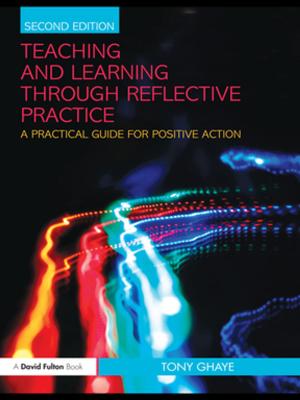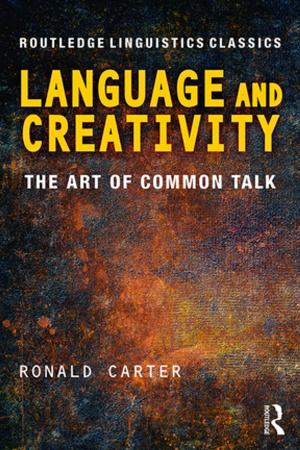Poverty and Schooling in the U.S.
Contexts and Consequences
Nonfiction, Reference & Language, Education & Teaching, Educational Theory, Educational Reform| Author: | Sue Books | ISBN: | 9781135607197 |
| Publisher: | Taylor and Francis | Publication: | July 19, 2004 |
| Imprint: | Routledge | Language: | English |
| Author: | Sue Books |
| ISBN: | 9781135607197 |
| Publisher: | Taylor and Francis |
| Publication: | July 19, 2004 |
| Imprint: | Routledge |
| Language: | English |
Poverty is an educational issue because it affects children's physical, emotional, and cognitive development. Especially in current times, taken-for-granted ideas about poverty and poor children must be scrutinized and reconsidered. That is the goal of this book.
Poverty and Schooling in the U.S.: Contexts and Consequences is in part a plea for educators and future educators to undertake the intellectual and emotional work of learning more about the social causes, as well as the sometimes life-altering consequences of poverty. Although such efforts will not eradicate poverty, they can help form more insightful educators, administrators, policymakers, and researchers. The book is also an effort to bring to the table a larger conversation about the educational significance of the social and legal policy contexts of poverty and about typical school experiences of poor children.
Poverty and Schooling in the U.S.: Contexts and Consequences:
*describes what teachers need to know or to understand about the contexts and consequences of poverty;
*provides information and analysis of the social context of poverty;
*examines the experience of many children and families living in poverty;
*documents the demographics of poverty and offers a critique of the official U.S. poverty metric;
*reports on continuing and significant disparities in school funding;
*presents historical context through a broad-brush review of some of the landmark legal decisions in the struggle for educational opportunity;
*looks at some typical school experiences of poor children;
*considers the consequences of the federal No Child Left Behind Act; and
*offers suggestions about the kind of educational reform that could make a difference in the lives of poor children.
This book is fundamental for faculty, researchers, school practitioners, and students across the field of education. It is accessible to all readers. An extensive background in social theory, educational theory, or statistics is not required.
Poverty is an educational issue because it affects children's physical, emotional, and cognitive development. Especially in current times, taken-for-granted ideas about poverty and poor children must be scrutinized and reconsidered. That is the goal of this book.
Poverty and Schooling in the U.S.: Contexts and Consequences is in part a plea for educators and future educators to undertake the intellectual and emotional work of learning more about the social causes, as well as the sometimes life-altering consequences of poverty. Although such efforts will not eradicate poverty, they can help form more insightful educators, administrators, policymakers, and researchers. The book is also an effort to bring to the table a larger conversation about the educational significance of the social and legal policy contexts of poverty and about typical school experiences of poor children.
Poverty and Schooling in the U.S.: Contexts and Consequences:
*describes what teachers need to know or to understand about the contexts and consequences of poverty;
*provides information and analysis of the social context of poverty;
*examines the experience of many children and families living in poverty;
*documents the demographics of poverty and offers a critique of the official U.S. poverty metric;
*reports on continuing and significant disparities in school funding;
*presents historical context through a broad-brush review of some of the landmark legal decisions in the struggle for educational opportunity;
*looks at some typical school experiences of poor children;
*considers the consequences of the federal No Child Left Behind Act; and
*offers suggestions about the kind of educational reform that could make a difference in the lives of poor children.
This book is fundamental for faculty, researchers, school practitioners, and students across the field of education. It is accessible to all readers. An extensive background in social theory, educational theory, or statistics is not required.















